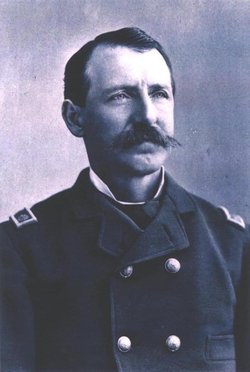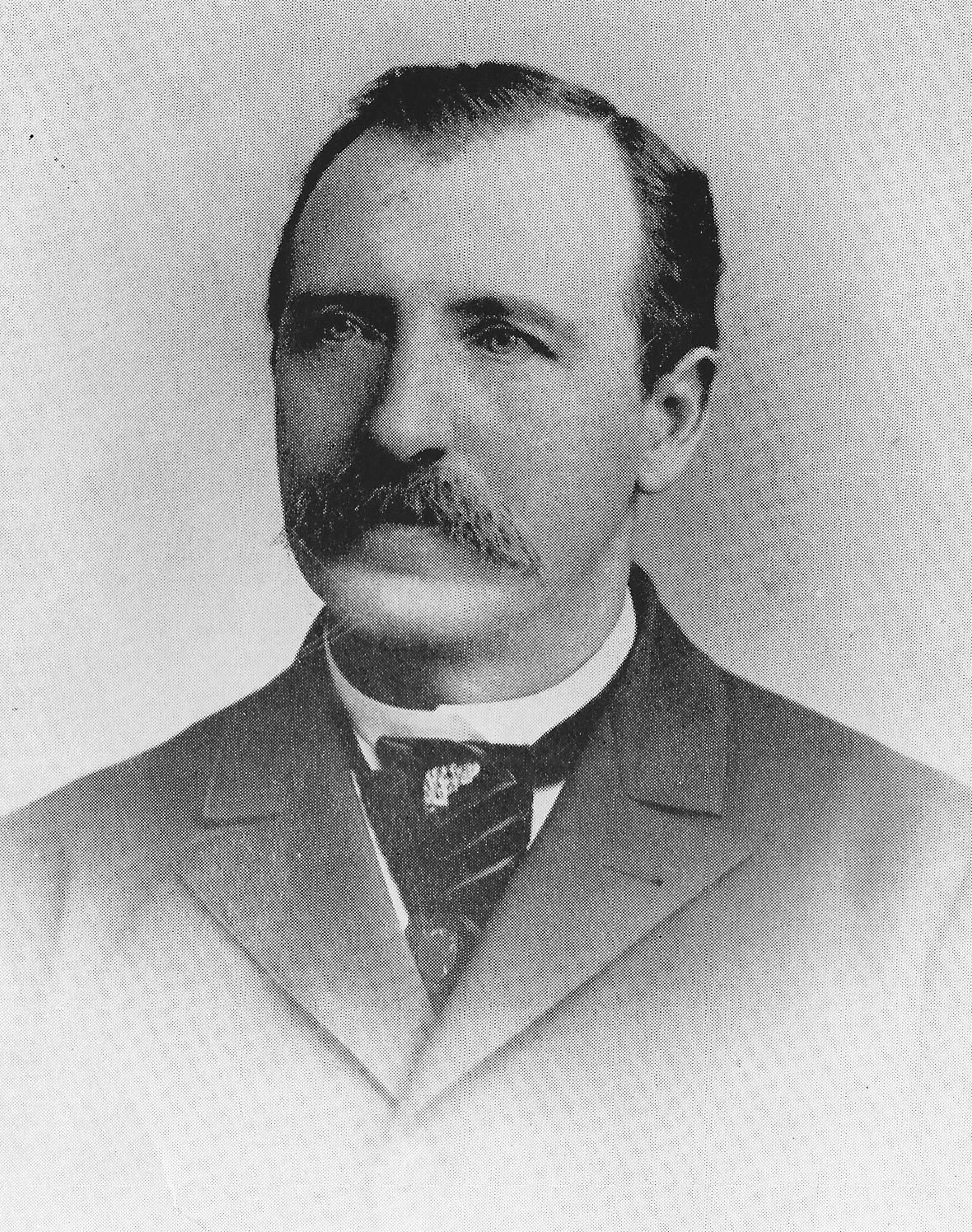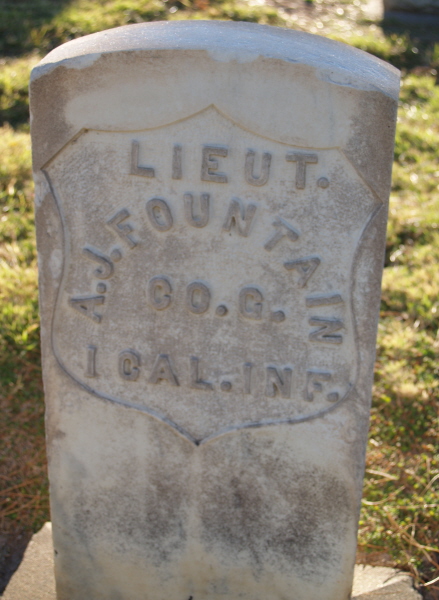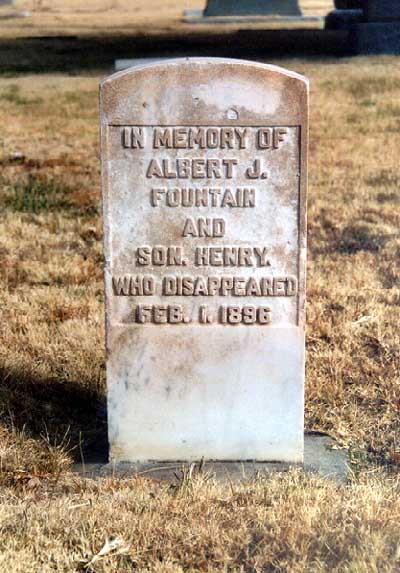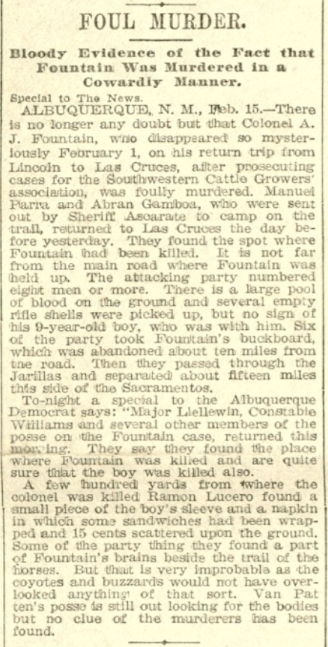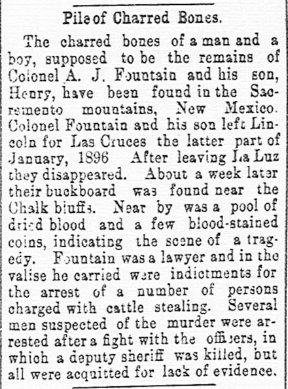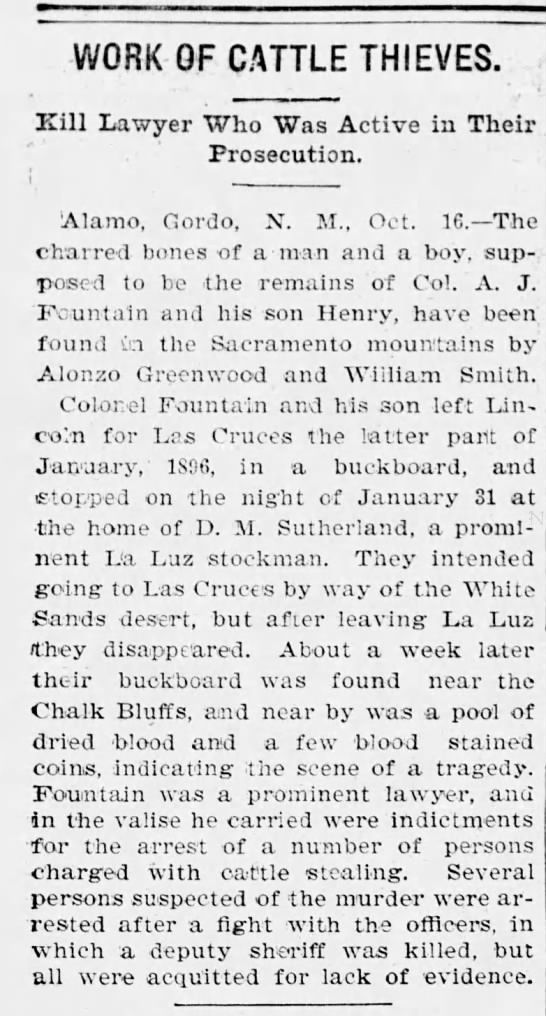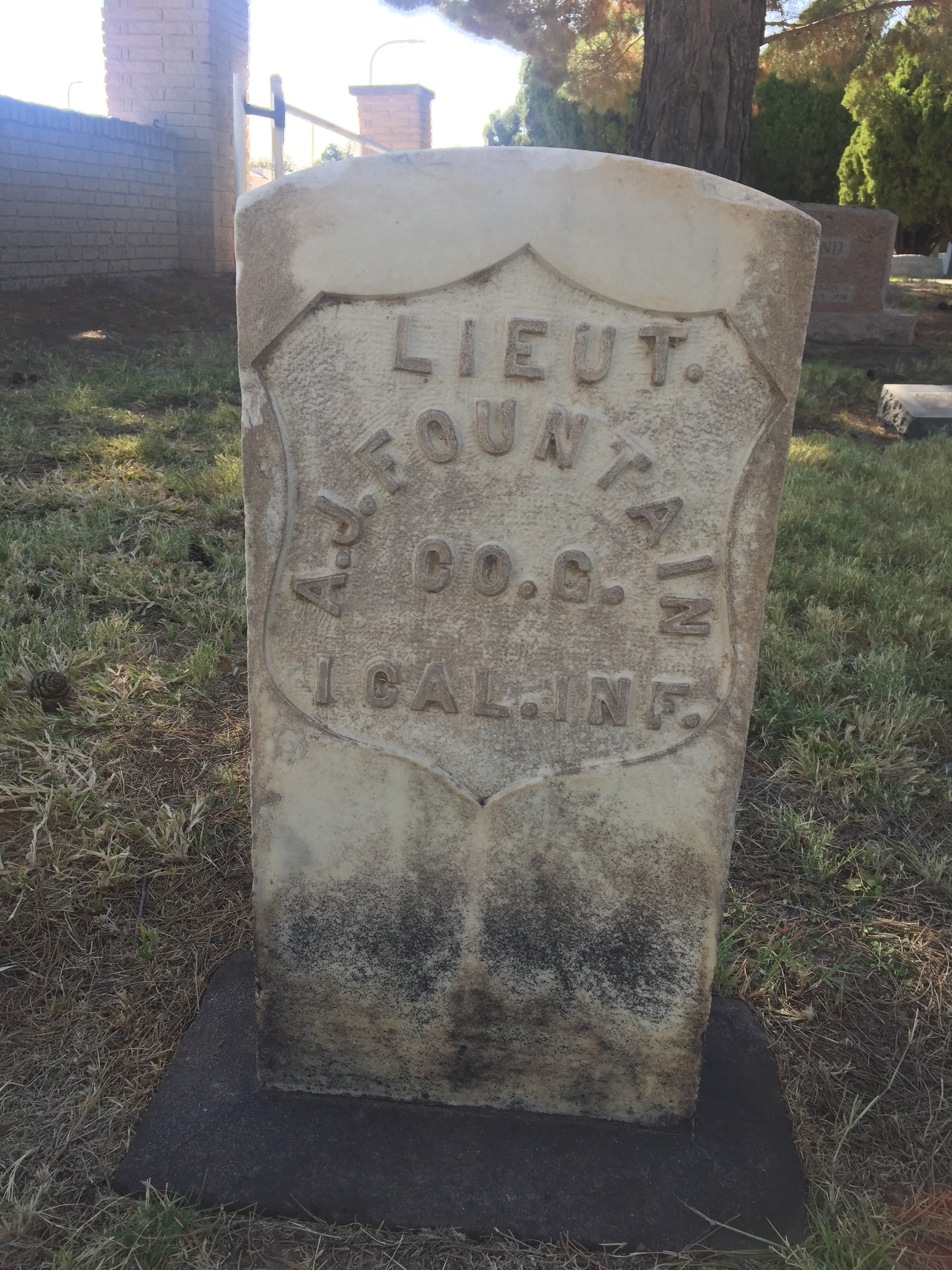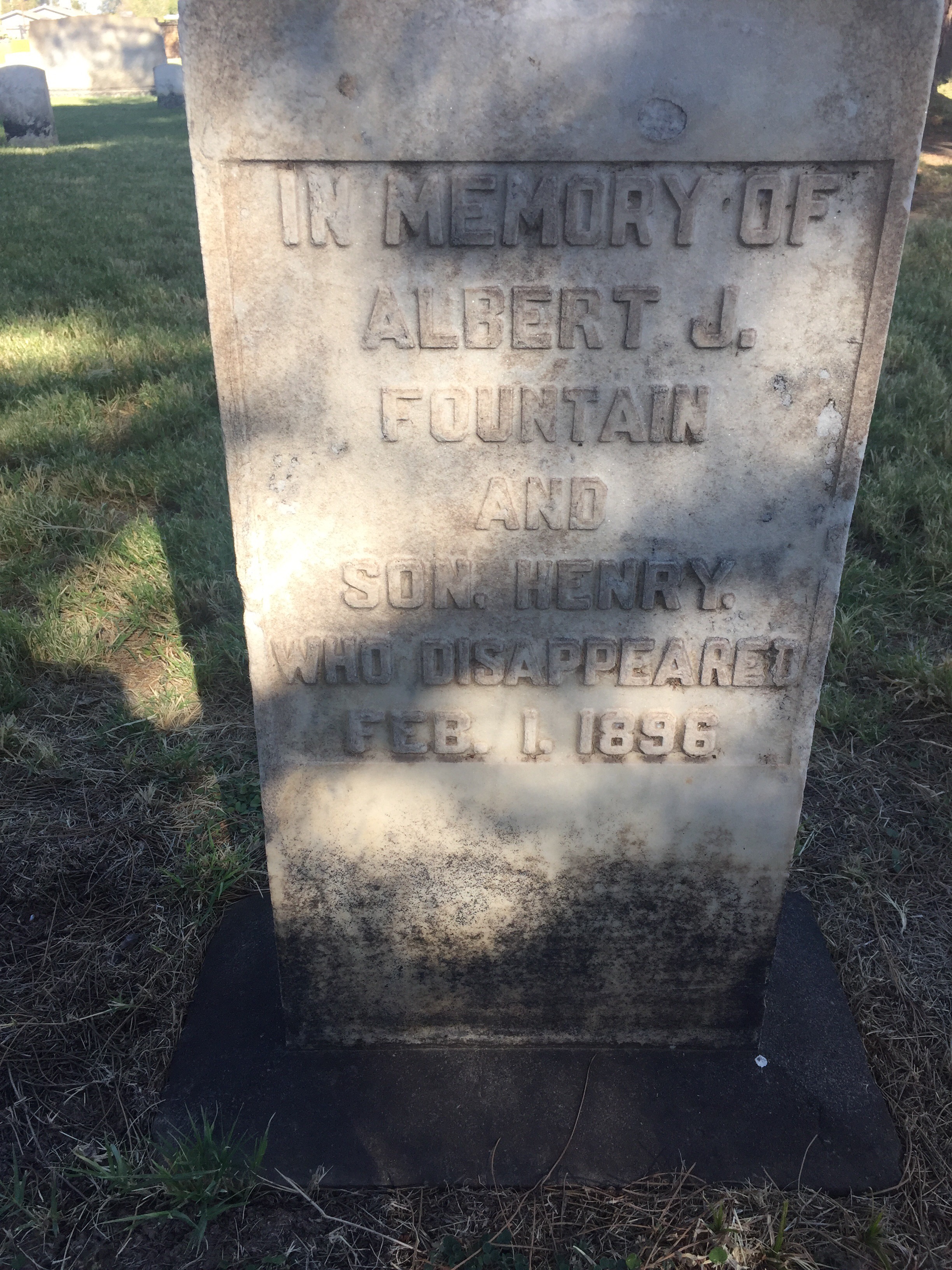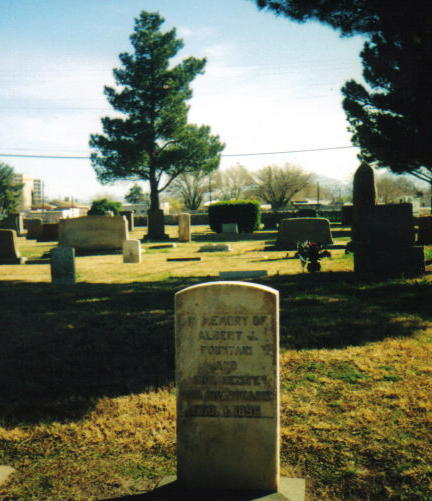Albert Jennings Fountain was born in New York City, New York, on October 23, 1838. He was the son of sea captain Solomon W. Jennings and Catherine de la Fountaine. After attending public school he went on to study at Columbia College. After graduation he headed west to California and at Sacramento found employment as a reporter with the Sacramento Union. This involved going to Nicaragua to cover William Walker's filibuster expedition. Fountain studied law at Sacramento and passed the California bar in 1860. During the Civil War he enlisted as a corporal for 3 years at Sacramento on August 26, 1861, and was mustered into Company E, 1st California Infantry, at Camp Union on September 16. Corporal Fountain was promoted to sergeant and appointed 1st sergeant by March 1862. He was posted to Mesilla, New Mexico Territory, where he married Marianna Pérez on October 26, 1862. First Sergeant Fountain was discharged at Fort Craig, New Mexico Territory, May 5, 1863, to accept a commission as a second lieutenant. He was mustered into Company G, same regiment, at Franklin (El Paso), Texas, on May 11. During his military service Lieutenant Fountain participated in the Mescalero relocation to Bosque Redondo and commanded New Mexico volunteers against the Mimbreño and Chiricahua Apaches. Wounds he received during the western Apache campaign led to his hospitalization at Fort Bliss. When Captain Albert H. French was mustered out with most of the soldiers in Company A (Old), 1st California Cavalry, at Las Cruces on August 31, 1864, Lieutenant Fountain was appointed "acting captain" to oversee reenlistments and recruiting for Company A (New), 1st California Cavalry. He was mustered out September 16, 1864, pending the results of his recruitment efforts. When these failed, his appointment as captain was officially rescinded January 19, 1865. Subsequently, Ebenezer C. Ledyard was appointed captain on March 2 and mustered in as Commander, Company A (New), 1st California Cavalry, March 9, 1865, after the company was successfully recruited to its full strength.
After leaving military service Fountain and his wife made their home in Franklin (El Paso), where he established a law practice and became a civic leader. Fountain was a staunch Republican and served as a county surveyor and as a U.S. Customs collector. Fountain attended the Republican convention at Corpus Christi in 1868 where he was elected vice chairman of the convention. Fountain, a Texas Senate candidate, won his election and went on to become President of the Senate. His politics gave him many enemies in western Texas. Following an ugly confrontation with Frank Williams in a saloon, Fountain killed him in a duel. His tenure in the legislature saw his proposal to extend suffrage to women defeated, whereas his effort for the incorporation of Franklin as El Paso succeeded. When his political fortunes in El Paso waned, he moved his family back to Mesilla in 1873. There he continued to pursue Republican politics and was elected to the New Mexico House of Representatives, at one time serving as speaker. He put on a uniform again in 1879 as captain of the Mesilla Scouts, ending his militia career as a Lieutenant Colonel. Fountain also returned to the newspaper business as publisher of the Mesilla Independent. His prowess as a lawyer resulted in several convictions of livestock rustlers and raised the ire of more than one bad hombre that ultimately culminated in tragedy. Fountain and his eight-year old son Henry disappeared without a trace after departing the residence of his friend and fellow Union veteran, David M. Sutherland, at La Luz on February 1, 1896. They were returning home following a court case in Lincoln. A week later the charred remains of a man and a young boy were found in the Sacramento Mountains and buried in unmarked graves. The remains were suspected of being those of Albert and his son Henry. Oliver M. Lee, Lee's foreman James R. Gililland, and William H. McNew were charged with the murders, but acquitted for lack of evidence. Another suspect was Thomas "Black Jack" Ketchum. A cenotaph to the memory of Albert and Henry Fountain was raised in the Masonic Cemetery in Las Cruces. Two years after his death Mariana filed for a Civil War widow's pension on June 24, 1898, and received certificate No. 576,952.
(Robert J. Casey, The Texas Border and Some Borderliners; Indianapolis: Bobbs-Merrill, 1950. Arrell Morgan Gibson, The Life and Death of Colonel Albert Jennings Fountain; Norman: University of Oklahoma Press, 1965. Handbook of Texas Online, Arrell Morgan Gibson, "FOUNTAIN, ALBERT JENNINGS" Texas State Historical Association, 2019)
Albert Jennings Fountain was born in New York City, New York, on October 23, 1838. He was the son of sea captain Solomon W. Jennings and Catherine de la Fountaine. After attending public school he went on to study at Columbia College. After graduation he headed west to California and at Sacramento found employment as a reporter with the Sacramento Union. This involved going to Nicaragua to cover William Walker's filibuster expedition. Fountain studied law at Sacramento and passed the California bar in 1860. During the Civil War he enlisted as a corporal for 3 years at Sacramento on August 26, 1861, and was mustered into Company E, 1st California Infantry, at Camp Union on September 16. Corporal Fountain was promoted to sergeant and appointed 1st sergeant by March 1862. He was posted to Mesilla, New Mexico Territory, where he married Marianna Pérez on October 26, 1862. First Sergeant Fountain was discharged at Fort Craig, New Mexico Territory, May 5, 1863, to accept a commission as a second lieutenant. He was mustered into Company G, same regiment, at Franklin (El Paso), Texas, on May 11. During his military service Lieutenant Fountain participated in the Mescalero relocation to Bosque Redondo and commanded New Mexico volunteers against the Mimbreño and Chiricahua Apaches. Wounds he received during the western Apache campaign led to his hospitalization at Fort Bliss. When Captain Albert H. French was mustered out with most of the soldiers in Company A (Old), 1st California Cavalry, at Las Cruces on August 31, 1864, Lieutenant Fountain was appointed "acting captain" to oversee reenlistments and recruiting for Company A (New), 1st California Cavalry. He was mustered out September 16, 1864, pending the results of his recruitment efforts. When these failed, his appointment as captain was officially rescinded January 19, 1865. Subsequently, Ebenezer C. Ledyard was appointed captain on March 2 and mustered in as Commander, Company A (New), 1st California Cavalry, March 9, 1865, after the company was successfully recruited to its full strength.
After leaving military service Fountain and his wife made their home in Franklin (El Paso), where he established a law practice and became a civic leader. Fountain was a staunch Republican and served as a county surveyor and as a U.S. Customs collector. Fountain attended the Republican convention at Corpus Christi in 1868 where he was elected vice chairman of the convention. Fountain, a Texas Senate candidate, won his election and went on to become President of the Senate. His politics gave him many enemies in western Texas. Following an ugly confrontation with Frank Williams in a saloon, Fountain killed him in a duel. His tenure in the legislature saw his proposal to extend suffrage to women defeated, whereas his effort for the incorporation of Franklin as El Paso succeeded. When his political fortunes in El Paso waned, he moved his family back to Mesilla in 1873. There he continued to pursue Republican politics and was elected to the New Mexico House of Representatives, at one time serving as speaker. He put on a uniform again in 1879 as captain of the Mesilla Scouts, ending his militia career as a Lieutenant Colonel. Fountain also returned to the newspaper business as publisher of the Mesilla Independent. His prowess as a lawyer resulted in several convictions of livestock rustlers and raised the ire of more than one bad hombre that ultimately culminated in tragedy. Fountain and his eight-year old son Henry disappeared without a trace after departing the residence of his friend and fellow Union veteran, David M. Sutherland, at La Luz on February 1, 1896. They were returning home following a court case in Lincoln. A week later the charred remains of a man and a young boy were found in the Sacramento Mountains and buried in unmarked graves. The remains were suspected of being those of Albert and his son Henry. Oliver M. Lee, Lee's foreman James R. Gililland, and William H. McNew were charged with the murders, but acquitted for lack of evidence. Another suspect was Thomas "Black Jack" Ketchum. A cenotaph to the memory of Albert and Henry Fountain was raised in the Masonic Cemetery in Las Cruces. Two years after his death Mariana filed for a Civil War widow's pension on June 24, 1898, and received certificate No. 576,952.
(Robert J. Casey, The Texas Border and Some Borderliners; Indianapolis: Bobbs-Merrill, 1950. Arrell Morgan Gibson, The Life and Death of Colonel Albert Jennings Fountain; Norman: University of Oklahoma Press, 1965. Handbook of Texas Online, Arrell Morgan Gibson, "FOUNTAIN, ALBERT JENNINGS" Texas State Historical Association, 2019)
Family Members
Advertisement
Records on Ancestry
Advertisement
